Ghost Trapper 13 The Trailwalker Read online
Page 13
“Good idea. What do you think about this girl he's seeing? Could she be, you know, a ghost?”
“If she was, she's got him fooled. That would take a powerful apparition. You try to get information out of him, he likes you better.” I headed into the second bunk room to view the Bobcat Cabin monitors. Stacey followed me and watched as I accessed the night's recordings.
“Just checking for activity around the time they woke me up,” I said.
The night vision camera had nothing for us. The thermal was more interesting, catching that broad, dispersed cold spot rolling through like a fog.
The audio had the most to offer.
It came in patches, like some annoying kid had grabbed a remote and kept turning the volume up and down at random. Laughter. A yell. A few running footsteps. A squeak and a scrape like one of the bunk beds being pushed aside, though nothing visibly moved inside the room. It was just like when I'd pursued the invisible giggler in that same cabin, the auditory apparitions starting and stopping abruptly, lasting only briefly.
“Wow,” Stacey said. “Sounds like the night campers came back.”
“And passed through here on their way to the lake. I wonder why they were going there.”
“If it's those three boys, or Gwendolyn, they'd be revisiting the scene of their death.”
“If it's them.” I nodded. “We should check whether Bobcat Cabin was the home of the boys who drowned. That would fit the picture.”
“Maybe you could ask Josh.”
“We're on cracking ice with Josh as it is. He was angry at the idea that those kids he knew could be haunting the place.” I stood up and drew on my jacket. “Come on, let's hike up to the lodge. There's something I want to check out.”
At the lodge parking lot, we checked the van, verifying that our equipment was still up and recording.
Inside the lodge, the ghosts of burning logs past filled my nostrils, as usual, as if trying to make me nostalgic for other people's lost childhoods. We passed through the utility closet, stepped over a fallen broom and through the folding doors, up through the narrow stairway to the attic. We made our way past the old sports equipment to the metal filing cabinets shoved against one side of the mock cabin, not far from the dusty fireplace.
“Yay, more paperwork,” Stacey said as I pulled open a drawer.
“We need to go around Josh to get a more detailed picture of the past,” I said. “So we're collecting contact information for everyone who was here that final year when the three boys died. Campers, counselors, anyone. Emphasis on people with nearby addresses.”
“But that contact information is thirty years old, and it would mostly be the parents of people who lived here.”
“On top of that, this is before the era of universal email and cell phone numbers that follow you. So, yep, probably a lot of hay, not a lot of needles.” I handed Stacey a stack of file folders. “You start with campers A through E. Make a checklist of everyone we need to call.”
She sighed. “Fine. I guess I'll spread them out on that old ping-pong table. Once I clear off the slide projector and what I assume will be some disgusting colonies of bugs and spiders.”
“That's the spirit,” I said, taking F through M for myself. I set them atop the file cabinets and started flipping through papers and harvesting data, twentieth-century style. So basically just copying things into my notebook.
It was much too early to cold call people at home; the sun wasn't even up yet. By the time it got to be a decent hour, though, Josh might be poking around, and he might not approve of us calling old campers from his childhood, especially not to talk about the boys' deaths. Hopefully Allison wouldn't let him fire us before we found some answers.
I wrote a checklist of campers and contact info, but paused when I opened one of the files. I flipped back in my notepad to confirm the name.
Thomas Fortenberry.
I was looking at the file of one of the dead campers.
I read it over. Thomas had attended Camp Stony Owl for four years, starting when he was eleven. He'd been fourteen when he'd died in the lake. There was contact information for his family down in Macon, but I had zero intention of ever calling his family to ask about their dead son. The file noted that he preferred active sports, was restless when it came to quieter activities.
After a minute, I closed the file and slid it into my backpack for later, then resumed gathering contact information about other campers.
We put everything back before sunrise and hurried downstairs. If Josh didn't find out we were combing through the files, he couldn't tell us to stop doing it.
After sunrise, we drove into town and stopped for breakfast at the Skillet Cafe, which served plenty of country-fried mountain-climbing fare: platters of pancakes and sausage, grits and eggs, gravy and biscuits, things Stacey was in the mood for and devoured. I ordered a bagel and picked at it. I was nervous about trying to reach out to witnesses.
My phone chimed, and I glanced at the text message.
“Who is it?”
“The librarian might have a lead. I'll head outside and call her back. You pay for breakfast.”
“Oh, yeah, convenient division of labor,” Stacey said as I left.
Outside, I took a moment to breathe in the warming mountain air. The town was tiny and picturesque, nestled in mountainous wilderness on all sides. I looked down the road toward the library as I called her back, not that I could see the little building from here. It was close, though.
“Hi,” she said. “It's Winnie, the librarian from yesterday?”
“Thanks for getting back to me,” I said.
“So, I thought about what you said. My great-grandmother actually went to Camp Stony Owl a long time ago. She was there when the counselor girl drowned.”
“Wow. Do you think she'd talk to us about it?”
“That's the thing. This is a small town, and there are certain things people won't want to discuss with outsiders. Meemaw will be happy to tell you about the more cheerful side of local history—she used to volunteer at the county historical society, over in the old courthouse, until she was almost ninety. But this is something dark and tragic. I've tried to explain that you need to hear about the dangers, about what happened to the kids. Anyway, she's agreed to meet you, at least, but I don't make any promises.”
“That's great!”
“Have I kept to my sacred librarian oaths now?” she asked.
“Definitely. Thank you so much.”
When Stacey emerged from the restaurant, I filled her in.
We drove to an assisted living home just outside town. Along the way, we crossed a bright blue lake. A couple of sailboats were out gliding in the spring sunshine. It looked much more appealing than paddling the black lake water at Stony Owl.
At the nursing home, Winnie came out to meet us and led us to a sunny room with a high ceiling and a fireplace, though the day was too warm for a fire.
“This is my great-grandmother, Mrs. Winifred Barrister,” the librarian said. “I was named after her.”
Mrs. Barrister occupied a wheelchair, parked in front of a card table by the window. She was a slight, birdlike woman, fragile-looking but with bright eyes. Though she was in her nursing home recreation room, she was dressed in a pantsuit and pearls, as if going to an office later.
“You'll have to excuse me,” she told the frowning, heavily mustached man across from her. A game of chess occupied the table between them.
“You don't have to apologize for beating me. I can see how this will turn out.” He stood, put on a hat. “One day, I will checkmate you.”
“You're learning, anyway,” she replied, smiling.
The man nodded at us as he stepped out of the room, heading for an outdoor garden area.
“Who was that, Meemaw?” Winnie asked as we took nearby chairs.
“He's a feisty young thing,” Mrs. Barrister said. “Just eighty-three. If only he'd shave that mustache. And he's not very good at chess.”
/> “When Meemaw turned a hundred, she got letters from the president, from the governor, from everyone,” Winnie said. “Isn't that right, Meemaw?”
“Not Johnny Carson, though,” Mrs. Barrister said. “I always did like him.”
“Meemaw, this is Ellie and Stacey. They're in town doing some historical research—”
“Have they been to the old courthouse?” Mrs. Barrister interrupted.
“Not yet, ma'am,” I said. “We passed it earlier—”
“You must go. I'd give you a tour myself, but I had to stop when I hit my nineties. Doctor insisted. My daughter will show you around when you go. It's a fine museum.” Mrs. Barrister went on to speak in great detail about the town's historic courthouse and the displays inside, which apparently included antique tools and a room full of miniatures and dollhouses.
I nodded along, not wanting to interrupt and seem rude, but watching for any opening to steer the conversation to the camp.
“They're actually researching Stony Owl, Meemaw,” Winnie cut in, after a few minutes. “Like I was explaining earlier.”
“Are they?” Mrs. Barrister adjusted her glasses as if to study us. “It's been closed a long time.”
“Our clients are reopening it this summer,” I said.
“That's not wise.” She shook her head.
“Why not?”
“There's been a lot of bad luck up there.”
“We've learned all about the boys, Paul and Thomas and Kyle. Our client knew them; they attended Camp Stony Owl together. What we don't know much about is the counselor who drowned, Gwendolyn Malloy. It seems like her death was very similar to the boys' deaths. The more we can learn, the more we can make the campground safe.”
Mrs. Barrister looked at us for a long moment, as if judging us carefully, then sighed.
“I suppose I could discuss it a little, if it's for the safety of the children. Do not take this as me condoning the return of that campground, however.”
“I understand, ma'am.” I gripped my pen tight, eager to take notes.
“Gwendolyn Malloy.” Mrs. Barrister's gaze drifted out the window, to the fuzzy pink mimosa tree outside. “She was a beauty. She was my counselor those last two years.”
“What year did you attend Camp Stony Owl?” I asked.
“I went in '26, '27, and '28. That first year, I was like a frightened little knock-kneed girl who didn't dare speak to anyone...by the end of that first summer, I never wanted to leave. Not the camp, not my fellow Rabbits from Rabbit Cabin. Those girls were like sisters to me.” Her eyes had a faraway look behind her glasses. She was starting to open up to us, as if this were a topic that some part of her really wanted to discuss, even if it was with oddball outsiders like us. “And part of me never did. I still dream about the good times. There was some magic there, I believe. Not necessarily bad magic. For me, it gave me strength. But maybe it's what you make of it. And what got made of it was so tragic in the end.”
“When did you meet Gwendolyn Malloy?” I asked.
“When she was my counselor, my second year. She was as pretty as a princess. Mean as one, too. I was Rabbit Cabin all three years. We were the best cabin on the girls' side, but then I'm partial.”
“So Gwendolyn wasn't the friendliest counselor?” I asked.
“Not if you were beneath her. She could put on the charm when she wanted, though. Such as when the boy counselors were around, or the boss.”
“Reverend Carmody?” I asked.
“He was such a stern man. Stern and distant. To a young girl like me, he was a bit like God himself. Thank you, dear,” she told Winnie, who placed a freshly brewed mug of tea in front of her.
“What about his wife, Laurie Ann?”
She smiled. “Mrs. Laurie Ann was sweet as sugar pie, or properly made tea. She always had a hug and a kiss for everyone. She was the sweetest. She seemed a mismatch for the Reverend. He was ex-Army, you know. Big, strong, angry-looking man. We were all glad Mrs. Laurie Ann was there to take his rough edges off.”
“I heard Gwendolyn died at the camp,” I said. “Is that accurate?”
“Oh, yes, that was the end of everything. It was tragic. Miss Gwen let her feelings run away with her.”
“Her feelings about what?”
Mrs. Barrister looked uncomfortable. “Maybe you should go,” she told Winnie. “This isn't appropriate talk for children.”
“I'm thirty-two, Meemaw.”
“Already? Time does run downhill, doesn't it? Steeper each year.” She shook her head. “What were we discussing?”
“How Gwendolyn let her feelings run away with her.”
“Oh, yes. She was engaged to another counselor, Mister Terrance. They went to the same college, too. The first summer they worked at the camp, you could see they were courting each other, but she played hard to get. She could play that because so many boys liked her. Mister Terrance was the prize catch, though. By the following summer, they were engaged to be married, and Gwendolyn loved to show off the pricey ring he'd bought her. Even if she'd showed it to you and told you all about it before, she'd do it again, whether you asked for a repeat performance or not.
“Well, she would sneak Mister Terrance into her room at night, against the Reverend's strict fraternization rules. One or two of us would always go spy on them. They were only kissing,” she added a little sharply, glancing at her great-granddaughter, who nodded. “But it was scandalous. And fascinating, if you want the truth. Like a romance novel. Maybe we didn't warm to Miss Gwendolyn like a friend, but I suppose we all wanted to be like her a little bit. And we wanted her to like us. The colder she was, the more we tried to win her favor.
“Well, Terrance was a handsome boy, and charming—Gwendolyn would pick the finest apple in the barrel, and they said his family had oodles of money, too. But when he slipped in at night, Gwen always reminded him they were not married yet. I'm sure you understand. I doubt boys have changed much.” She cast another concerned look at her thirty-two-year-old descendant as though worried about corrupting her.
I smiled but said little, jotting notes, absorbing every word.
“So Terrance got right upset as the summer went on,” she continued. “And he found he could get more of what he wanted elsewhere.”
“He started dating someone else?”
“Right there under Gwendolyn's nose. He didn't even have the decency to end the engagement first.” Mrs. Barrister shook her head.
“Was it another counselor?” I asked.
“No, ma'am.” Mrs. Barrister sipped her tea. Almost like she enjoyed dragging this out. Her eyes twinkled. “Winnie, I can't speak about this in front of you.”
“Meemaw, I'm—”
“I know how old you are. Would you mind stepping out into the garden? You can look at one of those pocket phones you all love to stare at these days.”
“Oh, actually I do need to check my messages.” Winnie hurried away, drawing out her phone. Mrs. Barrister smiled wryly after her, the way she'd smiled after beating her gentleman friend at chess.
“These kids today.” Mrs. Barrister looked at me and Stacey and gave a hmph, as if noticing we were even younger than her great-granddaughter. Just a couple of kids out on a jaunt in our jalopy, that was Stacey and me.
“So you were talking about Terrance's affair?” I said, my pencil touching my notepad again. “It wasn't with another counselor?”
“No.”
“Ew, it wasn't a camper though, right?” Stacey winced.
“Terrance got involved with Mrs. Laurie Ann.” Mrs. Barrister said this very softly, like a jeweler placing a delicate crystal on silk, presenting the piece of information like a rare treasure she knew we'd appreciate.
Appreciate we did—Stacey and I both dropped our jaws at that, at which the elderly lady smiled. Conversational checkmate, I suppose. Or at least a shocking piece of news.
“The counselor guy had an affair with the preacher's wife?” Stacey asked, in a whisper loud enough to turn mor
e than one silver head in the room away from their books and card games.
Mrs. Barrister nodded slowly, appreciating our appreciation of the great importance of this.
“How did you hear about this?” I asked, by way of gently checking her sources.
“A couple of us Rabbits eavesdropped on Miss Gwendolyn telling another girl counselor about it. Miss Gwen was in tears. She'd gone to Terrance's cabin to surprise him by sneaking in the window, but Mrs. Laurie Ann was already in his room with him. So Gwen came back and cried, and the other girl tried to comfort her. Said she'd never felt so betrayed.”
“What happened next?” I asked. It was pretty much all I could say.
“Miss Gwendolyn went out late the next night. We all pretended to be asleep when she checked out. Some of us watched her out the window as she walked away. I'll never forget it, because a storm was coming, and we could see her plain as day each time the lightning flashed. That was the last we saw of her. I wasn't there when they pulled her out of the lake, thank heavens. But after that, we were all sent home. The magic of those summers ended in such horrible tragedy.”
“Did the police investigate her death?” I asked.
“Oh, yes. Well, first there was the search party. She went missing for a couple of days, you see. The police led the search. It took some time to find her body because it was in the deep part of the lake, what we called the Cold Hole, because it was so deep the water felt icy even in summer. You had to hold your breath and swim far down, and it gets dark down there.” She shivered. “We'd swim as deep as we could, or as deep as we dared. I never cared for that part of the lake, truly. I liked where it was sunny and warm, and I could get to the shallows quick if need be.
“There's one thing the newspapers didn't say, out of respect for the family. And I only say it now because there's hardly anybody left alive to remember. In those days, everybody at Camp Stony Owl wore uniforms. Girls, whether campers or counselors, wore long skirts, and the skirts had pockets.”
“Nice,” Stacey said.
“When they found Miss Gwendolyn, well.” She shook her head. “Her pockets were filled with rocks. A canoe was caught in the brambles on the far shore from the camp, and later they found a broken oar. She'd paddled out in the middle of a storm to drown herself, you see. Thrown herself into the Cold Hole, the deepest part of the lake. Everyone knew where to find it.”

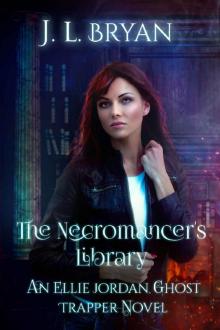 Ghost Trapper 12 The Necromancer's Library
Ghost Trapper 12 The Necromancer's Library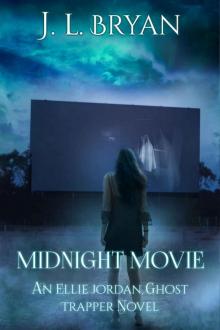 Ghost Trapper 14 Midnight Movie
Ghost Trapper 14 Midnight Movie_preview.jpg) Fairy Metal Thunder (Songs of Magic, Book 1)
Fairy Metal Thunder (Songs of Magic, Book 1)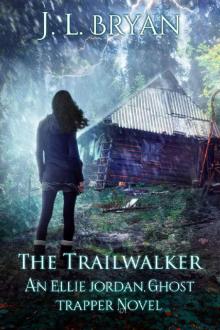 Ghost Trapper 13 The Trailwalker
Ghost Trapper 13 The Trailwalker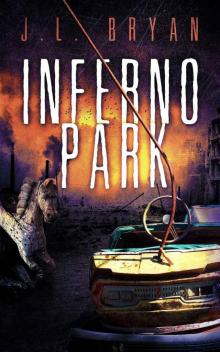 Inferno Park
Inferno Park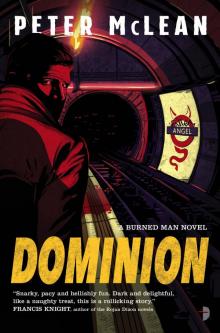 Dominion
Dominion Nomad
Nomad The Tower (Ellie Jordan, Ghost Trapper Book 9)
The Tower (Ellie Jordan, Ghost Trapper Book 9) Jenny Pox (The Paranormals, Book 1)
Jenny Pox (The Paranormals, Book 1)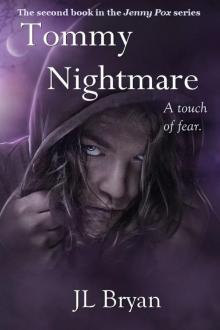 Tommy Nightmare (Jenny Pox #2)
Tommy Nightmare (Jenny Pox #2)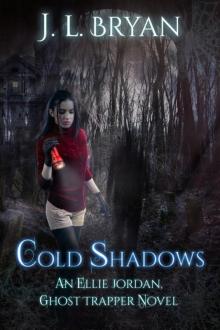 Cold Shadows (Ellie Jordan, Ghost Trapper Book 2)
Cold Shadows (Ellie Jordan, Ghost Trapper Book 2)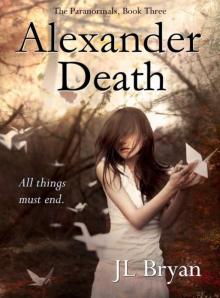 Alexander Death (The Paranormals, Book 3)
Alexander Death (The Paranormals, Book 3)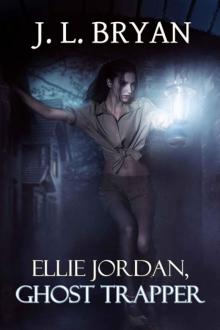 Ellie Jordan, Ghost Trapper
Ellie Jordan, Ghost Trapper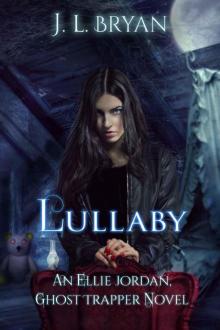 Lullaby (Ellie Jordan, Ghost Trapper Book 7)
Lullaby (Ellie Jordan, Ghost Trapper Book 7)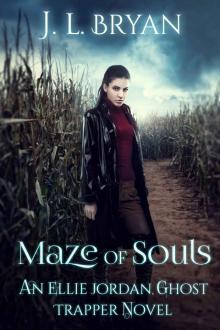 EJ06 - Maze of Souls
EJ06 - Maze of Souls Fairy Metal Thunder (Songs of Magic, #1)
Fairy Metal Thunder (Songs of Magic, #1)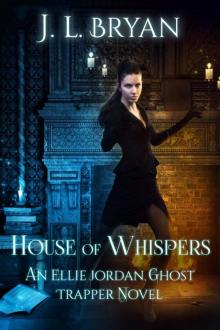 House of Whispers (Ellie Jordan, Ghost Trapper Book 5)
House of Whispers (Ellie Jordan, Ghost Trapper Book 5) Terminal (Ellie Jordan, Ghost Trapper Book 4)
Terminal (Ellie Jordan, Ghost Trapper Book 4) Jenny Pox
Jenny Pox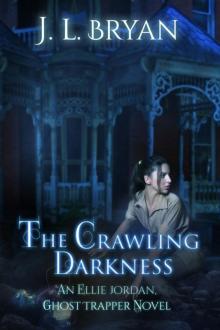 The Crawling Darkness (Ellie Jordan, Ghost Trapper Book 3)
The Crawling Darkness (Ellie Jordan, Ghost Trapper Book 3)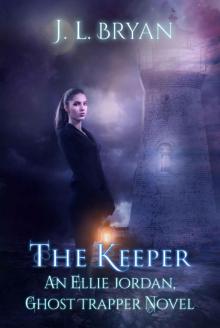 The Keeper (Ellie Jordan, Ghost Trapper Book 8)
The Keeper (Ellie Jordan, Ghost Trapper Book 8)